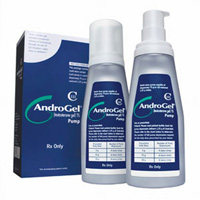
AbbVie ($ABBV) escaped the wrath of the FTC in a pay-for-delay suit over AndroGel generics, as a federal judge who previously threw out antitrust claims against the company rejected the agency's attempts to reconsider its case.
U.S. District Judge Harvey Bartle shot down the agency's claims that AbbVie violated antitrust law by striking a deal with Teva Pharmaceutical Industries ($TEVA) to sell a generic version of its cholesterol drug, TriCor, in exchange for delaying its AndroGel copycats. The FTC argued that the agreement unfairly undercut competition for AndroGel. But Bartle determined that "there is nothing in the complaint to demonstrate that it did anything other than to facilitate competition in the market for that drug."
The way Bartle sees it, the FTC has "no problem" with the arrangement between AbbVie and Teva. AbbVie did not just hand over TriCor to Teva for free, Bartle said; it asked the generics maker to pay for the cost of producing the drug plus a royalty and an additional fee. Those circumstances make the case different from FTC v. Actavis, which found that non-cash settlements between companies could be considered anticompetitive.
Back in December, the FTC urged a Pennsylvania federal court to move forward with a lawsuit alleging that an AndroGel patent settlement violates antitrust law. The agency had already sued Abbott Laboratories ($ABT)--which later spun off its pharma business as AbbVie--and a partner, Besins Healthcare, for filing sham patent infringement suits against potential generic competitors such as Teva to ward off AndroGel copycats.
According to the FTC suit, the companies struck a side deal with Teva while the suits were pending, allowing the generics maker to sell an authorized generic of TriCor in return for delaying its AndroGel copies. The move made "no independent business sense for AbbVie" and "forced consumers to overpay hundreds of millions for the drug AndroGel," the FTC said at the time.
Meanwhile, the FTC is cracking down on other alleged pay-for-delay deals after a 2013 Supreme Court ruling gave the agency the right to challenge brand-name drugmakers' patent settlements with generic companies. The Federal Trade Commission v. Watson Pharmaceuticals ruling, while dealing a blow to the industry, stopped short of taking on the FTC's stance that patent settlements should be found anticompetitive unless proven otherwise.
Last year, the FTC said it would step up its pay-for-delay fight, hoping to notch a $1 billion settlement in at least one pharma antitrust case. And earlier this year the agency got its wish, scoring a $1.2 billion settlement in a pay-for-delay case against Teva's Cephalon unit.
- here's the court opinion (PDF)
- read the FTC suit (PDF)
Special Report: The top 10 patent losses of 2015